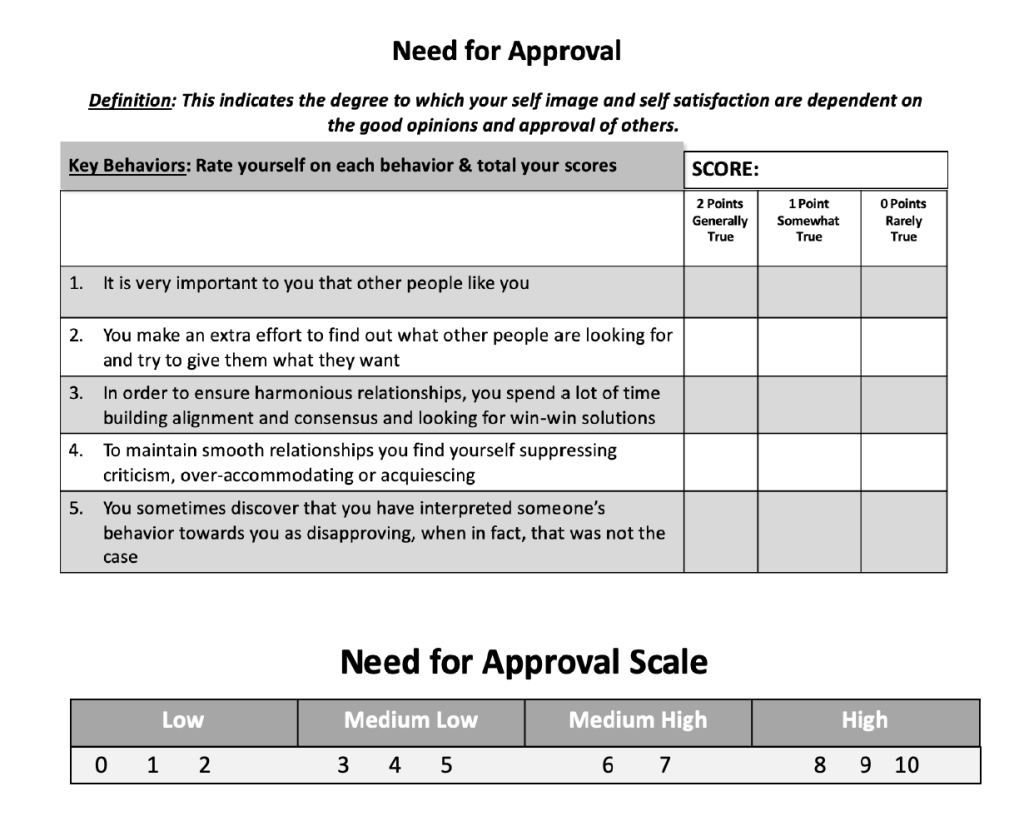The Need for Approval

Finding the Right Balance in How Much You care About Other People’s Approval
How concerned are you about other people’s judgements regarding your decisions, performance, or values? Their disapproval may matter to you more than you realize. Neuroscientists have pointed out that our brains are often “velco” for negatives and “teflon” for positives. For most of us this tendency really flares up when we receive someone’s disapproval, criticism or disrespect.
Our emotional reaction, the amount of time we spend focusing and even ruminating on it, and the number of times the memory pops up, are often way out of proportion to the importance of the person or the consequence of the disapproval. Do you spend equal time dwelling on someone who approves of your actions?
The level of our need for approval can have a direct impact on our confidence, getting our needs met, and our equanimity. Fortunately it’s not something that is fixed; that we are stuck with for life. People can learn to discern when seeking approval is useful and when making the approval of others too important, undermines us. As with any aspect of ourselves that we may want to modify, an excellent starting point is to raise your self-awareness.
Here is a quick behavioral assessment that will help you estimate your current need for approval.

Let’s examine three different ranges of scores:
0 – 2 Low Need for Approval
8 – 10 High Need for Approval
3 – 7 Moderate Need for Approval
0 – 2 Range: Low Need for Approval
The Positives
“Care about what others think and you will always be their prisoner” – Lao Tsu
“If a man does not keep pace with his companions perhaps it’s because he hears
a different drummer. Let him step to the music he hears, however
measured or far away” – Henry David Thoreau
So if you operate down at this end of the scale you see that you have some good companions. Your passion, talent, and willingness to take risks that others wouldn’t are unlikely to be deterred or deflected. This attitude definitely served me well in 1964 when I decided to go to Japan to practice Zen despite my family and friends vigorously trying to talk me out of it. If you can achieve success in your career through self-reliance and following your intuition, this low need for approval may be a plus.
The “Watchouts.” (These don’t apply to all Low Need for Approval people, but are definitely a risk for some).
- Collaboration: People can accept that you don’t agree with them but they will perceive a lack of respect if you are not even interested in or curious about their opinion.
- Caring: A few years ago there was a fashion jacket that had “I really don’t care, do you?” printed on the back. Some people at this low end of the scale exhibit body language that conveys the same message. In a team or family setting this lack of caring or even concern about your impact will hurt some relationships.
8 – 10 Range: High Need for Approval
The Positives
High Need for Approval people are very attuned to other people’s moods, needs, and body language. There are many roles (customer service, sales, consumer insight, training) that leverage these skills. In addition, on any team, this person may tap into the “pulse”; the team dynamics, as well as play a role in maintaining harmony.
The “Watchouts.” Unfortunately the costs of operating at the high end of the scale are considerable.
- Suppress Your “Voice”: Self-censoring ideas, points of view, opposing opinions due to fear of disapproval. This can extend to not listening to your inner “voice.”
- Suppress Your Needs: This can become such an ingrained habit that the person is only dimly aware of their actual needs.
- Insecurity: Your equanimity and confidence fluctuate with the moods and evaluations of others.
- Vulnerable to Manipulation: There are people who will not only notice, but they will take advantage of your fear of displeasing.
3 – 7 Range: Moderate Need for Approval
What a Low Need for Approval person can learn from a Moderate Need for Approval person:
- Curiosity: As Steven Covey suggested, “Seek first to understand before you seek to be understood.” Someone with moderate scores is more likely to ask open-ended questions, trying to bring out someone else’s point of view or knowledge. At the same time they keep a clear distinction between understanding someone versus agreeing with someone, and have no difficulty going their own way if not persuaded.
- Caring/Considerate: If they are working in a group or on a team they will pay attention to and factor in how other people want to be treated. They are also more likely to notice their impact on people and make adjustments when possible.
What a High Need for Approval person can learn from a Moderate Need for Approval person:
- “Voice”: They may do it later in a meeting; they may craft their message (see Executive Vocabulary, Rule 9, Chapter 12, in A Woman’s Guide to Power, Presence and Protection by M. Bauer, M. Seldman, P. Santilli, and J. Thomas-Williams, 2022 Optimum Press) but they will have a “seat at the table” and express their ideas.
- Needs: They are comfortable stating needs, setting boundaries and saying NO.
- Selective: Nice to Have vs. Need to Have. Moderate Need for Approval people may seek approval while realizing that with most people and most situations NOT getting it is only an inconvenience, disappointment, or learning opportunity. They will selectively identify the key people for whom securing their approval is a top priority.
- Realistic: If they work with someone who rarely smiles or shows approval and is quick to find fault they reset their expectations (much lower). In this way they spare themselves from constantly expecting something this person won’t provide.
- Check it Out: Many times someone’s negative body language, sour expression, or neglectful communication is not about you. The Moderate Need for Approval person is more likely to “check it out” rather than assume disapproval.
Tips for Everyone:
1. Expand Your Range: “If the only tool you have is a hammer everything looks like a nail.” – Abraham Maslow . If you expand your skill repertoire you can leverage skill selection to deploy the most effective level (Need for Approval) for the situation.
2. Spend more time feeling good and learning by focusing on the approval, validation, and support that comes your way.
3. Foundation of Self-Approval: No amount of approval from others can compensate for disapproving of yourself. (See recent article on “Calm Self-Critique” and next week’s article on, “Identifying Your Strengths and Potential” to increase your self-approval).
